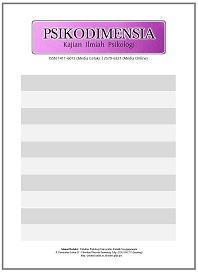Pengaruh Hubungan Orangtua-Anak terhadap Kepercayaan antar Pribadi yang di moderasi oleh Kedekatan dengan Teman Sebaya pada siswa SMA
Abstract
High school students in the adolescence development are influenced by several factors including the environment in physical and psychological development. Attachment to family and friends has an important role in the establishment of trust, including the Interpersonal Trust. Based on that, this study aims to determine the influence of parent and child attachment to interpersonal trust that is moderated by individual attachment to peers. The subjects in this study were high school students on grade 12th as many as 99 students. The study utilized the scale of Parent-Child Relationship, Interpersonal Trust and IPPA, and applied statistics with multiple linear regression techniques. This study shows that Parent and Child Relationship was negatively correlated with Interpersonal Trust, with correlation coefficient of -0.111 and significance value of 0.275 (p> 0,05), indicating that the greater the parent relationship with the child, the less Interpersonal Trust, and vice versa. Nevertheless, the analysis results show that the Moderation Variable (Peer Attachment) was influential, and able to strengthen the relationship between parent and child to Interpersonal Trust.
Keywords
Full Text:
PDFReferences
Azwar, Saifuddin. (1999). Reliabilitas dan Validitas Cetakan Ketiga. Yogyakarta:Pustaka Belajar.
Arikunto, S. (2006). Prosedur Penelitian Suatu Pendekatan Praktik. Jakarta: PT. Rineka Cipta.
Barakat, A. & Othman, A. The Five-Factor Model of Personality and Its Relationship to Cognitive Style (Rush and Prudence) and Academic Achievement Among a Sample of Student. Vol 6, No. 35, 2015.
Bernheimer, Lucida P.; Gallimore, Ronald; & Weisner, Thomas S. (1990). Ecocultural Theory as a Context for The Individual Family Service Plan. Journal of Early Intervention, 14(3), 219-233.
Besger, S. K. (2007). Update on Bulliying at School: Science Forgotten? Developmental Review, 27, 90-126.
Hazen, N. (2013). Maternal Empathy and Changes in Mothers’ Permissiveness as Predictors of Toddlers’ Early Social Competences with Peers: A Parenting Intervention Study. Journal Child Family Studies, 22, 769-778.
Doherty-Derkowski, G., 1995. Quality matters: Excellence in early childhood programs. Don Mills, Addison-Wesley Publishers Ltd.
Dweck, C. S. (2006). Mindset: The new psychology of success. New York: Random House.
Guralnick, Michael J. (1989). Recent Development in Early Intervention Efficacy Research: Implications for Family Involvement. Topics in Early Childhood Special Education, 9(3), 1-17.
Greenberg, M. T. & Armsden, G. (2009). Inventory of Parent and Peer Attachment (IPPA). Prevention Research Center.
Grinder, R. E. (1978). Adolescence. New York:John Wiley and Sons.
Hartup, W. W. (1996). The company they keep: Friendships and their developmental significance. Child Development, 67, 1–13.
H., John., IV, Boman., D., Marvin., Krohn., L., Chris., Gibson., M., John., Stogner. (2012). INVESTIGATING FRIENDSHIP QUALITY: An Expolration of Sel-Control and Social Control Theories’ Frienship Hiphoteses.,2012,012.
Hughes, Patrick, & MacNaughton, Glenda. (2000). Consensus, Dissensus or Community: The Politics of Parent Involvement in Early Childhood Education. Contemporary Issues in Early Childhood, 1(3), 241-258.
Kleptsova, E.Yu. (2013). Monitoring of the humanization of interpersonal relations in educational activities. Bulletin of the Cherepovets State University, 1 (46). V. 2: 133-135.
Kleptsova, E. Y., & Balabanov, A. A. (2016). Development of Humane Interpersonal Relationship. International Journal of Environmental & Science Education. Vol. 11. No. 4, 2147-2157
Mussen, H. P., Cenger, J. J., & Kagan, J. (1980). Child Development and Personality. New York:Harper and Row Publishers.
Nashori, H. Fuad. (2008). Psikologi Sosial Islami. Bandung:PT Refika Aditama.
Obiunu, Jude J. (2015). Relationship between Parents and Peer Influencences on Qualities of Adolescent Friendship. Journal of Education and Practice. Vol. 6. No.8. 2015.
Obozov, N.N. (1979). Interpersonal relations. Leningrad: Leningrad State University, 6 p.
Parker, J. G. & Asher, S. R. (1993). Friendship and Friendship Quality in Midle Childhood: Link with Peer Group Acceptance and Feeling of Loneliness and Social Dissatisfaction. Journal of Developmental Psychology, 29, 611-621.
Piehler, T. F., & Dishion, T. J. (2007). Interpersonal dynamics within adolescent friendships: Dyadic mutuality, deviant talk, and patterns of antisocial behavior. Child Development, 78, 1611–1624.
Pinheiro Mota, C. & Matos, P. M. (2012). Peer Attachment, Coping and Self-Esteem in Institutionalized Adolescents : The Mediating Role of Social Skills, 28-87.
Raboteg-Saric, Z. & Sakic, M. Applied. (2014). Relations of Parenting Styles and Friendship Quality to Self-Esteem, Life Satisfaction and Happiness in Adolescents, 9: 749
Smith, Anne B., & Hubbard, Pat M. (1988). The Relationship between Parent/ Staff Communication and Childdren’s Behaviour in Early Childhood Settings. Early Child Development and Care, 35, 13-28.
Tagney, J. P., Baumeister, R. F., & Boone, A. L. (2004). High Self-Control Predict Good Adjustment, Less Pathology, Better Grades, and Interpersonal Succes. Journal of Personality. Blackwell Publishing. 72 (2), 271-324.
Zora Raboteg Saric, Marija Sakic. (2014). Relation of Parenting Styles and Friendship Qualities to Self- Esteem, Life Satisfaction and Happiness in Adolescents. Applied Researches in Qualities of Life. Vol 9 (3) p 749-765.
DOI: https://doi.org/10.24167/psiko.v16i2.1069
Print ISSN : 1411-6073 | online ISSN : 2579-6321 View My Stats

This work is licensed under a Creative Commons Attribution 4.0 International License.




















